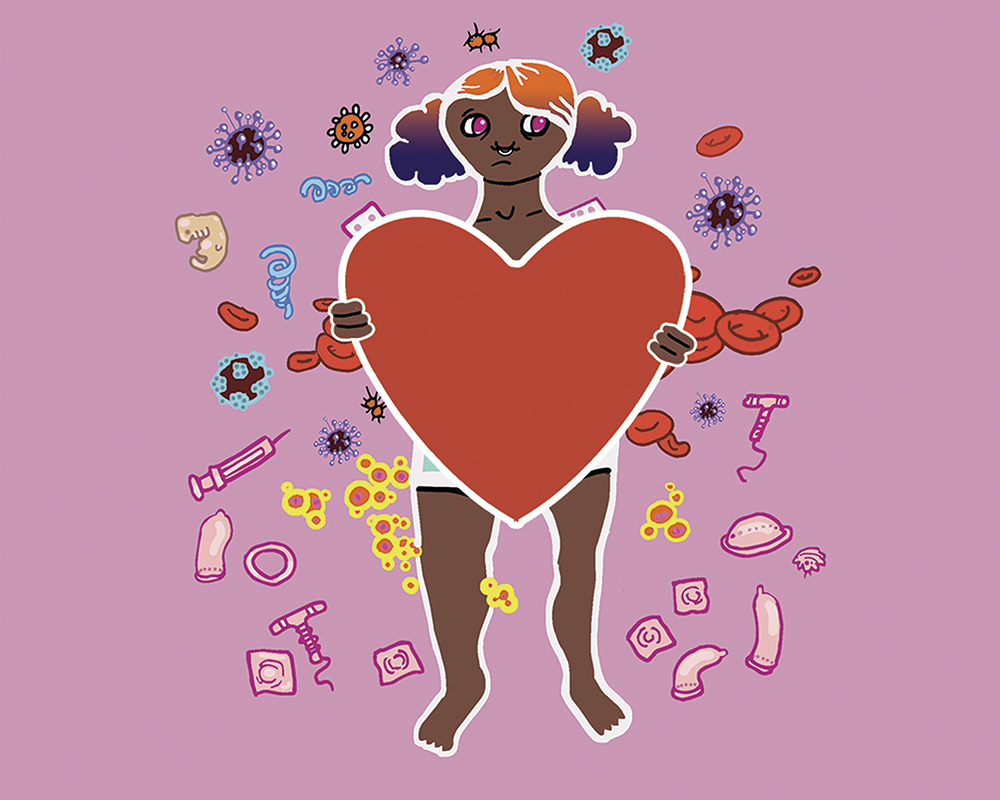Spread the love, not the disease
With Valentine’s Day just around the corner, some of us who are romantically involved are preparing to spend the day with that special someone. While indulging your partner is important, so is keeping in mind the risk of contracting a sexually transmitted infection (STI) or disease (STD).
According to Women’s Health, the difference between STIs and STDs are whether symptoms are present, and ailments are only described as diseases when symptoms are present. “You can have an infection, such as chlamydia, without symptoms,” said Angela Jones, M.D., an ob-gyn at Healthy Woman Obstetrics and Gynecology in Monmouth, NJ. Since 2005, the Canadian government has recorded a rise in reported STD/STI cases, mainly cases concerning chlamydia, which is the most reported sexually transmitted disease in Canada. In 2009-2010, 68 per cent of sexually active 15 to 24 year-olds reported using a condom the last time they had intercourse, according to Statistics Canada.
The World Health Organization states that there are more than 30 viruses, bacterias and parasites that can be transmitted sexually. Of these, eight are the cause of most reported STD/STI cases. Four are currently curable: syphilis, gonorrhoea, chlamydia and trichomoniasis. The other four—hepatitis B, herpes, human immunodeficiency virus (HIV) and human papillomavirus (HPV)—are viral infections and are not curable.
“While most people think that STDs[/STIs] are only transmittable through sexual intercourse, like penetration, there are really, in fact, many ways of getting them,” said Charlotte Gagné, a sexology student at the Université du Québec à Montréal. “For example, [they can be transmitted through] skin to skin contact, blood and sharing sex toys. It can also be passed down from mother to child.”
One of the best ways to avoid contracting and spreading STDs/STIs is to use protection. Condoms are accessible, relatively affordable and they come in various styles that can make using protection fun. Trojan has ribbed condoms geared for female pleasure, their thinnest condom called the ‘bareskin’ and even benzocaine-lubed condoms for climax control, all meant to maximize pleasure. Just be sure to always check condoms for rips or tears, as well as expiry dates, before use.
STDs/STIs not only affect you physically, but mentally and socially as well. “Our society judges and rejects people with STDs[/STIs],” said Gagné. “They are often seen as prostitutes or floozies. People are afraid to touch them, they act as if they have the plague.”
Kelyane Dizazzo, a student at Collège Ahuntsic, has contracted chlamydia in the past. “It felt like the end of the world,” said Dizazzo. “I know it could’ve been something much worse, but when I got the news, I couldn’t stop crying,” she said. Whether you’re single or in a relationship, the importance of getting regularly tested for STDs/STIs while sexually active is pertinent. Concordia Health Services recommends getting tested every two months, or between different sexual partners.
“I lost some friends,” added Dizazzo. “Their girlfriends didn’t want them near me, let alone talking to me.” Dizazzo went on to explain that if she had known how badly this disease would affect her, she would have been much more careful.
“Being informed is key,” said Gagné. “Knowing about the different types of STDs[/STIs] and how they can be transmitted not only helps you know how to protect yourself, but it lets you know what to expect if you are not careful.”
Being honest with yourself and your partner can help stop the spread of these sexually transmitted diseases. Having an STD/STI does not only affect you, it also affects your future sexual partners, and previous ones that could be carriers or infected as well.
“There a lot of resources available to help prevent STDs[/STIs], but you have to look for them,” said Gagné. “If you think you have an STD[/STI] or just want to make sure that everything is okay, go to an STD[/STI] testing clinic. It’s better to be safe than sorry.”
Valentine’s Day is about showing your loved ones how much you care. While Hallmark holidays will push us to buy material items as expressions of our love, what better gift is there than the gift of protection and peace of mind?
Feature graphic by @spooky_soda
